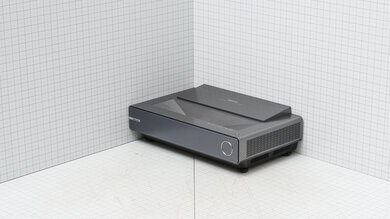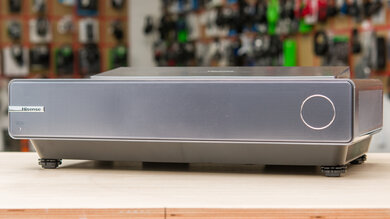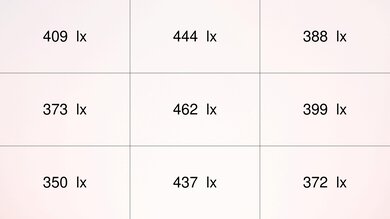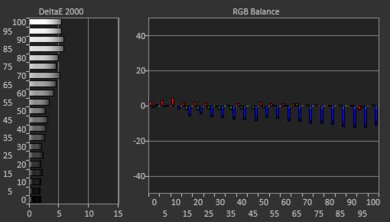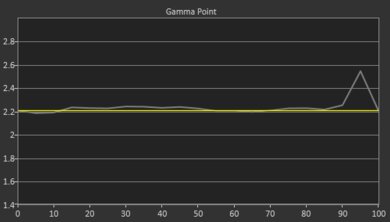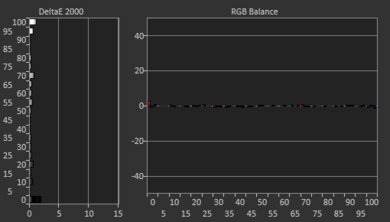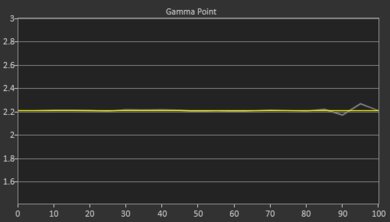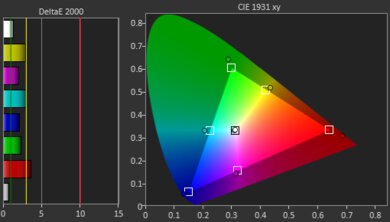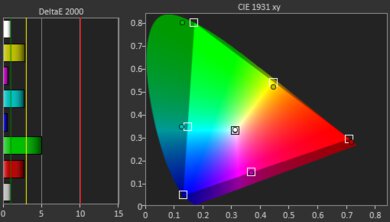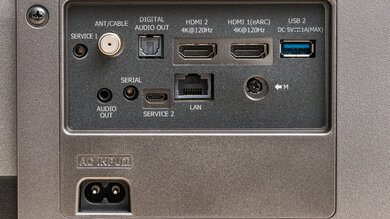The Hisense PX1-PRO is an Ultra Short Throw (UST) 4k HDR laser projector. It's capable of projecting content at an extremely short distance from the screen or wall: it projects a 90" image at a distance of 10.7" and up to a 130" image at a distance of 19.3". Its two HDMI 2.1 ports—one of which doubles as the ARC port—have 4k @ 120Hz support. It has Bluetooth and Wi-Fi support and comes with the Android TV smart interface with full Chromecast integration and an integrated 30W Dolby Atmos sound system.
Our Verdict
The Hisense PX1-PRO is decent for watching movies. It's bright enough to look good in dim rooms but not bright enough to handle moderately lit rooms. Its contrast is okay, providing a pleasant viewing experience in dark rooms even if its blacks aren't inky. It has a wide color gamut, but unfortunately, it's not bright enough to make them pop. The projector's color accuracy is decent out-of-the-box, but you'll have to invest in a calibrator if you care about color accuracy.
- Wide color gamut that looks especially good in HDR.
- Fully featured projector with Android TV, two HDMI 2.1 ports, Wi-Fi and Bluetooth.
- Ultra Short Throw capabilities, so you can place it very close to the wall or screen.
- Not bright enough to make colors pop.
Changelog
-
Updated Dec 16, 2024:
We mentioned the newly reviewed Hisense PX3-PRO in the Contrast section of this review.
- Updated Aug 14, 2024: Mentioned the newly-reviewed NexiGo Aurora Pro in the Brightness section of this review.
- Updated May 21, 2024: Updated text throughout the review according to Test Bench 0.9, mainly in the Verdict, Compared To Other Projectors and Contrast sections.
- Updated May 21, 2024: We've converted this review to Test Bench 0.9. We've overhauled our Contrast tests, as we now measure contrast at various average pixel levels (APL). You can see the full changelog here.
Check Price
Differences Between Sizes And Variants
We bought and tested the Hisense PX1-PRO. This projector has no variants, but there's a higher-end model, the Hisense PX2-PRO. The two projectors are very similar, although the PX2-PRO has a higher brightness rating, has Dolby Vision support, and comes with three HDMI ports instead of two, although one is an HDMI 2.0 port.
Our unit was manufactured in November 2022; you can see the label here.
Popular Projector Comparisons
The Hisense PX1-PRO is a decent Ultra Short Throw (UST) projector, but it's extremely expensive. You can get projectors with better image quality for less; the XGIMI HORIZON Ultra, Epson Home Cinema 3800, and even the Epson Home Cinema 5050UB are cheaper than the Hisense with better image quality. The XGIMI, in particular, is quite comparable to the Hisense as it's a modern projector with a full suite of smart features, while the Epsons are barebone projectors for home theater use. If you want a UST projector, the Epson EpiqVision Ultra LS300 is cheaper and better than the Hisense PX1-PRO. Ultimately, the Hisense isn't a great value, and better options exist.
Check out our recommendations for the best home projectors and the best projectors for home theater. If you'd prefer a cheaper unit, look up the best projectors under $1,000 instead.
The Epson EpiqVision Ultra LS800 is better than the Hisense PX1-PRO. They're both Ultra Short Throw (UST) projectors, but you can place the Epson even closer to the screen or wall than you can with the Hisense. The Epson is much brighter than the Hisense, so it's more versatile when it comes to room lighting conditions. While both projectors are decent regarding out-of-the-box accuracy, the Hisense has more calibration options, so it looks much better than the Epson after calibration. The Hisense also has a wider color gamut, but it's not bright enough to really make colors pop.
The Formovie THEATER is better than the Hisense PX1-PRO for watching movies. The Formovie has much deeper contrast, so it looks punchier in pitch-black rooms when watching movies. Still, the Hisense is much more accurate before and after calibration, has a slightly wider color gamut, and has better gaming features than the Formovie due to its two HDMI 2.1 ports, which can do 4k @ 120Hz.
The Hisense PX3-PRO is a noticeable improvement over the Hisense PX1-PRO, as it's brighter and has better contrast than its predecessor. The PX3-PRO also has a wider color gamut and projects punchier colors. Finally, it also has more features than the older model.
The Hisense PX1-PRO is a bit better than the XGIMI AURA. The Hisense is a bit more colorful due to its wider color gamut and is much more color-accurate both prior and after calibration. However, the XGIMI has better contrast and looks better in a dark room.
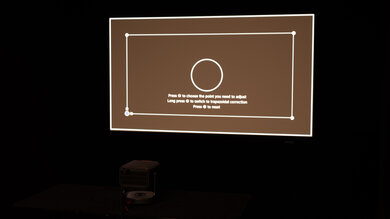
We've independently bought and tested over 60 projectors, and we've published all the detailed results for each so you can decide which one to buy. These have all been tested under the same standardized methodology, allowing you to compare them side by side. We still have all these projects in our lab so we can continually go back and compare them to ensure our reviews are still accurate. All our test methodology is also public on our website, so you can validate the results yourself.
Throw Calculator
Global Controls
Test Results

The projector isn't meant to be portable as it's quite heavy and lacks an integrated battery, so you need to plug it in. The projector has a feature for auto keystone correction, but it doesn't work well, so you'll need to adjust the image geometry manually, and it also doesn't have autofocus. It has a 30W speaker system, so you won't need to worry about connecting it to a soundbar if you move it.
This projector uses a laser light source, which requires no maintenance and will last for 25,000 hours or more, according to Hisense. It's not a true 4k projector, as it uses pixel shifting to create a higher-resolution image. This offers better quality than a pure 1080p projector but isn't as good as a native 4k projector. It's an Ultra Short Throw (UST) projector, so it's capable of projecting a 90" image at a distance of 10.7" and up to a 130" image at a distance of 19.3".
The Hisense PX1-PRO's peak brightness is alright. Its white light output and brightness uniformity are decent, but its color output is only mediocre; colors don't pop on this projector. If you're looking for a brighter UST projector, look at the NexiGo Aurora Pro instead.
The projector has okay contrast, so it looks fine when watching content in a dark room, although its blacks aren't very inky. If you're looking for a similar projector with better contrast, consider the Formovie THEATER or the Hisense PX3-PRO.
The Hisense PX1-PRO's pre-calibration accuracy is decent. However, its white balance is only alright; blues are underrepresented in most shades of white, giving whites a red hue. The projector's color temperature also leans very warm. Thankfully, its color accuracy is good, although whites and cyans show a fair amount of accuracy errors.
This projector has full 20-point white balance calibration and color calibration. Its color accuracy after calibration is excellent, although most colors are still slightly oversaturated, more so for reds. Its white balance accuracy is fantastic, with barely any errors, and the color temperature is now exactly on target.
The projector has Android TV built-in, and it's smooth and fast to use. The projector has full Chromecast integration, so you can play content from your phone directly on the projector. Finally, the projector has an integrated 30W Dolby Atmos sound system.

